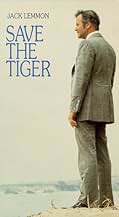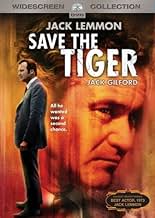Troubled garment manufacturer Harry Stoner tries to make his small debt-ridden factory survive, hires an arsonist to burn down a building so Harry can collect the insurance money, he pimps f... Read allTroubled garment manufacturer Harry Stoner tries to make his small debt-ridden factory survive, hires an arsonist to burn down a building so Harry can collect the insurance money, he pimps for clients, and has flashbacks to the war.Troubled garment manufacturer Harry Stoner tries to make his small debt-ridden factory survive, hires an arsonist to burn down a building so Harry can collect the insurance money, he pimps for clients, and has flashbacks to the war.
- Won 1 Oscar
- 2 wins & 5 nominations total
- Ula
- (as Liv Von Linden)
- Tiger Petitioner
- (as Biff Elliott)
- Model
- (uncredited)
- Director
- Writer
- All cast & crew
- Production, box office & more at IMDbPro
Featured reviews
really did have the everyman down to a science. The movie is an excellent
commentary on dreams coming apart, the loss of old friends, and realizing
youre time may have come and gone. Not exactly the most uplifting movie but it is raw and honest. Lemmon and his partner run Capri Casuals, a women's wear
line based in southern California in the early 70's. (incidentally the name comes from the island where most of Lemmons war time buddies were killed and
buried) When times get tough and Lemmon is lowering himself by becoming a
pimp to a big customer, he realizes his American dream might be over. In
consultation with his partner he decides to hire an arsonist to destroy his factory for the insurance. An intense, searing performance from Lemmon, makes Save
the Tiger a movie that should be watched for years to come.
Highly Recommended.
Harry Stoner (Lemmon) is as an LA businessman who seeks an arsonist to burn him out so he can collect the insurance and rebuild his failing business. His aging partner Phil Greene (Jack Gilford) opposes this, but realizes at his age (close to 65) he may never find another job. Both men are decent but jaded, and troubled by the lost innocence (or false innocence) of their youth in Brooklyn. Harry is also troubled by post-traumatic stress flashbacks from his lost comrades at Anzio in World War II, while Phil is troubled by going along with a crime that means losing his integrity. Both men appear to be Jewish, and may feel added burdens that come with having beaten anti-Semitic discrimination (or worse). There is the also longing for their boyhood in New York, before crime made cities less safe, and before the Dodgers (plus these two men) deserted Brooklyn for Los Angeles - which is not quite the sunny paradise that both probably hoped for. This film also came out in 1973, as Watergate, Vietnam, and the non-success of the Great Society all seemed to evidence a certain national decline.
Save the Tiger is like "Death of Salesman Goes To LA." There is fantasy, failure, and searing struggles for success. The two main characters are not so tragic as Willie Loman; yet they are not all that far removed, either.
Jack Lemmon delivers a brilliant, Oscar-winning performance as Harry Stoner, a middle-aged man at the end of his tether, who confuses his personal midlife crisis, and the failure of his fashion business, with what he sees as the USA's moral decline in the post-war years. Obsessed with the lost cameraderie of his active service in the war, with the baseball and jazz giants of yesteryear, and with the slain and fallen idols of the 60s (Kennedy, King, Monroe etc), he sleepwalks into his own moral abyss of an arson plot, comforting himself that he is no worse than the times in which he lives.
Lemmon's character is countered by those of Phil Greene, his business partner, convincingly played by Jack Gilford, and Meyer (William Hansen), the firm's veteran, expert cutter and refugee from Nazism. Phil does not suffer Harry's sense of disillusion, because he is too down-to- earth to have experienced the illusion in the first place; Meyer, also, despite superficial discontent with the changing times, gains strength from his skill and family life.
For me, the main theme here is the familiar one of the lost American Dream, and the film brings to mind the final lines of the seminal exploration of that theme, the Great Gatsby - "So we beat on, boats against the current, borne back ceaselessly into the past." Harry's American Dream is not of a golden future, but of a golden past; it isn't lost, it simply never existed. But, that said, in this movie thematic analysis definitely takes second place to appreciation of Lemmon's bravura performance.
The film almost has a low budget, made-for-television feel and look. But it still delivers an engrossing story of people under stress.
Did you know
- TriviaActor Jack Lemmon waived his usual fee and worked for scale plus a percentage of the gross. Scale was US $165 a week at the time.
- GoofsHarry wipes Fred's face almost completely clean of the red body paint. In a subsequent shot, Fred's face is covered with red paint again.
- Quotes
Myra: Are you OK? Do you want something?
Harry Stoner: Yes. I want that girl in a Cole Porter song. I wanna see Lena Horne at the Cotton Club - hear Billie Holiday sing fine and mellow - walk in that kind of rain that never washes perfume away. I wanna be in love with something. Anything. Just the idea. A dog, a cat. Anything. Just something.
- ConnectionsFeatured in Paramount Presents (1974)
- SoundtracksAir Mail Special
Composed by Jim Mundy, Benny Goodman & Charlie Christian
- How long is Save the Tiger?Powered by Alexa
Details
- Release date
- Country of origin
- Languages
- Also known as
- Save the Tiger
- Filming locations
- Production companies
- See more company credits at IMDbPro
Box office
- Budget
- $1,000,000 (estimated)
Contribute to this page


































